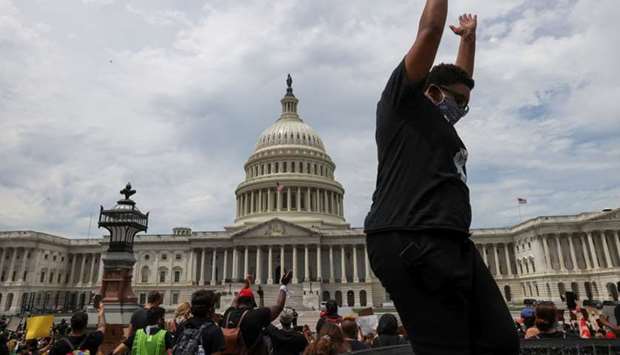US protesters ignored curfews as they vented their anger over the death of an unarmed black man at the hands of police, but there was a drop in violence overnight and President Donald Trump's defense secretary said he opposed sending in troops.
George Floyd died after a white policeman knelt on his neck for nearly nine minutes in Minneapolis on May 25, reigniting the explosive issue of police brutality against African Americans five months before the Nov. 3 presidential election.Tens of thousands of people took to the streets of cities coast to coast for an eighth night in protest over the death of Floyd and brutality against other black Americans.
Authorities took the unusual step of ordering curfews, and bands of police in riot gear and other heavily armed officers patrolled, ringing landmarks and shouting at protesters while helicopters roared overhead.
While most protests have been peaceful, there was less looting and vandalism, and clashes between police and protesters were more sporadic.
Defense Secretary Mark Esper said he did not back deploying troops to patrol the country.
"The option to use active duty forces in a law enforcement role should only be used as a matter of last resort and only in the most urgent and dire of situations. We are not in one of those situations now," he told a news briefing.
Trump had threatened to use the military to battle violence and had derided local authorities, including state governors, for a response he said failed to dominate the disturbances.
In New York, which last ordered a curfew 75 years earlier during World War Two, Mayor Bill de Blasio said an 8 p.m. curfew would be in place until Monday.
Clashes between protesters and police and looting of some stores in New York gave way to relative quiet in the early hours. Police made 200 arrests, largely for curfew violations.
In Los Angeles, many demonstrators who defied a curfew were arrested, but calm was restored by mid-evening to the extent that television switched back to regular programming.
Large marches and rallies also took place in Philadelphia, Atlanta, Denver and Seattle, and smaller ones in many other communities.
Massive crowds have gathered internationally, from Paris to Nairobi. In London, tens of thousands chanted "no justice, no peace, no racist police" and "Black lives matter" in a march on Wednesday.
A Reuters/Ipsos poll conducted on Monday and Tuesday found that 64% of American adults were "sympathetic to people who are out protesting right now," while 27% said they were not and 9% were unsure.
The officer who knelt on Floyd's neck, Derek Chauvin, 44, has been fired and charged with third-degree murder and second-degree manslaughter. Three other officers involved in the incident have been fired but not charged.
The Trump administration deployed the National Guard and other federal law enforcement forces across Washington on Tuesday. Protests were largely peaceful, including families with children, for hours but became tense after dark particularly near the White House where a new fence was shaken.
It was a marked departure from Monday night, when protesters were cleared from the White House area before curfew and Trump walked with officials including the country's top uniformed military officer and the Secretary of Defense to pose holding a Bible in front of a church where there had been a fire.
On Wednesday, Trump defended his walk to the church in the face of criticism that law enforcement had used force to clear the way of peaceful demonstrators.
"Most religious leaders loved it. It's only the other side that didn't like it, you know, the opposing, the opposition party," Trump, whose support comes in part from evangelical Christians, told Fox News Radio on Wednesday.
The Secret Service, responsible for the president's protection, would clear any area where he was due to travel, without his requesting it.
Many protesters have used the slogan "take a knee", referring to a protest against racism that started in 2016 when a US National Football League player knelt on the ground rather than stand during the playing of the National Anthem.
Trump, a Republican seeking re-election in November, has used hardline rhetoric, urging police to "get tough" on Twitter on Wednesday, a day after his likely challenger, former Democratic Vice President Joe Biden, vowed to heal the racial divide.
In Atlanta, four police officers and two former officers were charged with using excessive force while arresting two students. Minneapolis launched an investigation into possible discriminatory practices by police over the past decade.
A 30-year-old motorist was arrested on Tuesday after striking three police officers at a demonstration in Buffalo on Monday.

